Inherent rate of sa node - Study guides, Class notes & Summaries
Looking for the best study guides, study notes and summaries about Inherent rate of sa node? On this page you'll find 94 study documents about Inherent rate of sa node.
Page 3 out of 94 results
Sort by
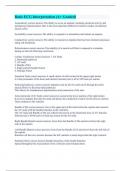
-
Basic ECG Interpretation (A+ Graded)
- Exam (elaborations) • 9 pages • 2024
-
- $10.39
- + learn more
Automaticity correct answers The ability to act as an impulse, initiating electrical activity and spontaneous depolarization (this is the most important difference between cardiac and skeletal muscle cells) Excitability correct answers The ability to respond to a stimulation and initiate an impulse Conductivity correct answers The ability to transmit an impulse that has been initiated and passes along cell membrane Refractoriness correct answers The inability of a muscle cell fiber to r...
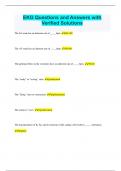
-
EKG Exam Questions and Answers with Verified Solutions
- Exam (elaborations) • 11 pages • 2023
- Available in package deal
-
- $9.49
- + learn more
The SA node has an inherent rate of __-__bpm. 60-100 The AV node has an inherent rate of __-__bpm. 40-60 The perkinje fibers in the ventricles have an inherent rate of __-__bpm. 20-40 The "ready" or "resting" state. polarization The "firing" state or contraction. depolarization The return to "rest". repolarization
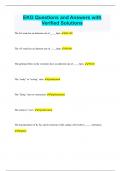
-
EKG Questions and Answers with Verified Solutions
- Exam (elaborations) • 11 pages • 2023
-
Available in package deal
-
- $9.49
- + learn more
EKG Questions and Answers with Verified Solutions The SA node has an inherent rate of __-__bpm. 60-100 The AV node has an inherent rate of __-__bpm. 40-60 The perkinje fibers in the ventricles have an inherent rate of __-__bpm. 20-40 The "ready" or "resting" state. polarization The "firing" state or contraction. depolarization The return to "rest". repolarization The transportation of K, Na, and Ca into/out of the cardiac cell result in _____ formation. Impulse To determine the ra...
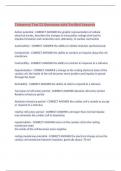
-
Telemetry Test 52 Questions with Verified Answers,100% CORRECT
- Exam (elaborations) • 7 pages • 2023
-
Available in package deal
-
- $10.99
- + learn more
Telemetry Test 52 Questions with Verified Answers Action potential - CORRECT ANSWER the graphic representation of cellular electrical events, describes the changes in intracardiac voltage that lead to impulse formation and conduction and, ultimately, to cardiac contraction Automaticity - CORRECT ANSWER the ability to initiate impulses spontaneously Conductivity - CORRECT ANSWER the ability to conduct an impulse along the cell membrane Contractility - CORRECT ANSWER the ability to con...
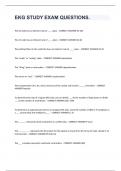
-
EKG STUDY EXAM QUESTIONS.
- Exam (elaborations) • 7 pages • 2024
-
Available in package deal
-
- $11.29
- + learn more
EKG STUDY EXAM QUESTIONS. The SA node has an inherent rate of __-__bpm. - CORRECT ANSWER 60-100 The AV node has an inherent rate of __-__bpm. - CORRECT ANSWER 40-60 The perkinje fibers in the ventricles have an inherent rate of __-__bpm. - CORRECT ANSWER 20-40 The "ready" or "resting" state. - CORRECT ANSWER polarization The "firing" state or contraction. - CORRECT ANSWER depolarization The return to "rest". - CORRECT ANSWER repolarization The transportation of K, ...
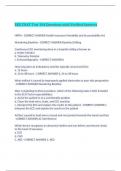
-
EKG CRAT Test 104 Questions with Verified Answers,100% CORRECT
- Exam (elaborations) • 14 pages • 2023
-
Available in package deal
-
- $11.49
- + learn more
EKG CRAT Test 104 Questions with Verified Answers HIPPA - CORRECT ANSWER Health Insurance Portability and Accountability Act Wandering Baseline - CORRECT ANSWER Baseline Drifting Continuous ECG monitoring done in a hospital setting is known as: a. Holter Monitor b. Telemetry Monitor c. Echocardiography - CORRECT ANSWER b How long does an ambulatory monitor typically record and ECG: a. 12 hours b. 24 to 48 hours - CORRECT ANSWER b. 24 to 48 hours What artifact is caused by I...
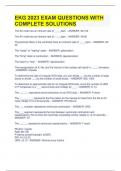
-
EKG 2023 EXAM QUESTIONS WITH COMPLETE SOLUTIONS
- Exam (elaborations) • 5 pages • 2023
-
Available in package deal
-
- $9.09
- + learn more
EKG 2023 EXAM QUESTIONS WITH COMPLETE SOLUTIONS The SA node has an inherent rate of __-__bpm. - ANSWER- 60-100 The AV node has an inherent rate of __-__bpm. - ANSWER- 40-60 The perkinje fibers in the ventricles have an inherent rate of __-__bpm. - ANSWER- 20-40 The "ready" or "resting" state. - ANSWER- polarization The "firing" state or contraction. - ANSWER- depolarization The return to "rest". - ANSWER- repolarization The transportation of K, Na, and Ca into/out of...
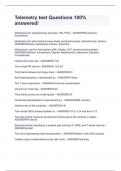
-
Telemetry test Questions 100% answered!
- Exam (elaborations) • 3 pages • 2024
- Available in package deal
-
- $13.99
- + learn more
Medications for pulselessness (asystole, Vfib, PEA): - ANSWEREpinephrine, Amiodarone Medications for slow rhythms (sinus brady, junctional escape, idioventricular, blocks) - ANSWERAtropine, epinephrine infusion, dopamine Medications used for fast rhythms (Afib, Aflutter, SVT, junctional tachycardia): - ANSWERCardizem, Amiodarone, Digoxin, Betablockers, adenosine, lidocaine, Procainamide Inherent SA node rate - ANSWER60-100 The normal PR interval - ANSWER0.12-0.20 Time frame betwee...
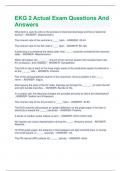
-
EKG 2 Actual Exam Questions And Answers
- Exam (elaborations) • 6 pages • 2023
-
Available in package deal
-
- $9.99
- + learn more
EKG 2 Actual Exam Questions And Answers What term is used to refer to the process of electrical discharge and flow of electrical activity? - ANSWER- Depolarization. The inherent rate of the ventricle is_____ bpm. - ANSWER- 20-40. The inherent rate of the SA node is ____ bpm. - ANSWER- 60-100. If polarizing is considered the ready state, then _____ would be considered the recovery state. - ANSWER- Repolarization. When stimulated, the ________ branch of the nervous system will incre...
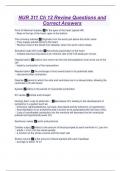
-
NUR 311 Ch 12 Review Questions and Correct Answers
- Exam (elaborations) • 7 pages • 2024
-
Available in package deal
-
- $8.99
- + learn more
Point of Maximal impulse At the apex of the heart (apical HR) - Base is the top of the heart; apex is the bottom. The coronary arteries Originate from the aorta just above the aortic valve - They supply arterial blood to the heart - Receive most of the blood from diastole, when the aortic valve closes. Sinoatrial node (SA node) the primary pacemaker of the heart - initiates electrical impulses at an inherent rate of 60-100 beats per minute. Depolarization sodium ions move into the cell and po...

That summary you just bought made someone very happy. Also get paid weekly? Sell your study resources on Stuvia! Discover all about earning on Stuvia


